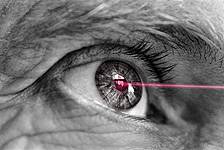Cataract surgery is one of the safest, most effective ocular surgeries— improving vision for over 95 percent of patients.
Are cataracts significantly affecting your vision and performance of regular activities? You may be a candidate for cataract surgery.
What is cataract surgery?
Cataract surgery is one of the safest and most effective types of ocular surgery.
Cataract surgery involves replacing your clouded eye lens with a clear, plastic intraocular lens (IOL). The IOL contains your optical prescription to correct any refractive errors and improve your clarity of vision.
If you have a cataract in each eye, your eye doctor will only remove one cataract at a time. A separate surgery will need to be scheduled after your first eye has healed.
Cataract surgery has proven to be very successful in restoring vision, while reducing or even eliminating the need to wear glasses.
What do I need to know about cataract surgery?
Cataract surgery is usually performed in a hospital or outpatient clinic.
The procedure generally takes around 30-45 minutes. Soreness or discomfort is common after the procedure, but should subside within a couple of days.
Most patients notice improved vision the following day, with continued improvement over the following weeks. For optimal results and to reduce complications, follow all post-surgery care instructions, and follow-up with your eye doctor as directed.
What should I expect on the day of my procedure?
On the day of your procedure, arrange for a friend or relative to accompany you to the hospital or outpatient clinic.
Before the procedure, your eye doctor will place eye drops into your eyes to both dilate your pupils and numb your eyes and surrounding tissues. You will be awake during the surgery, but given a sedative or “twilight-anesthesia” to help you to relax and remain calm throughout the procedure. As a result of the sedative, you may feel a bit tired for a few hours after your surgery.
After the surgery, your eye doctor may prescribe eye drops or other medication to reduce inflammation, prevent infection, and control your intraocular pressure, the pressure within your eye.
Your eye doctor may also give you an eye patch or protective shield to wear after the surgery. It is recommended to wear the eye shield for a few days, especially while you sleep. This protection will help you rest easier and eliminate the concern that you may rub or press on your eye during the night.
If you have cataracts, contact an eye doctor near you, who can diagnose and discuss the best treatment options.
SEE RELATED: Cataract Surgery Complications
What should I expect in the weeks following cataract surgery?
You will probably need to schedule a few eye exams after your surgery— usually a day or two after your procedure, then again the following week, and then again one month later. These follow-up exams are important for your eye doctor to check how your eye is healing and adjusting to its new IOL.
Your vision may be blurry for a few days post-surgery— this typically clears up as your eye adjusts to its new lens. You may also find that colors appear brighter than usual, because you are now looking through a new, clear lens— while prior to the surgery, your lens was yellow, or tinted brown from the cataracts.
As your eye heals, you may experience some itching or mild discomfort— this is a normal part of the healing process and is to be expected— try to avoid rubbing or pushing on your eye as much as possible.
Any discomfort you experience should subside within a couple of days. In general, it usually takes around eight weeks to completely heal from cataract surgery.
Are there any side effects of cataract surgery?
Contact your doctor immediately if you experience any of the following symptoms post-surgery:
- Vision loss
- Eyelid swelling
- Increased eye redness
- Pain that does not subside with pain-relieving medication
- Light flashes or floaters
Will I need to wear glasses after cataract surgery?
During cataract surgery, the natural lens is replaced by an artificial intraocular lens (IOL). Prior to surgery, your eye doctor will calculate a precise measurement of your refractive error, in order to apply your optical power to your IOL.
In many cases, the IOL will provide 20/20 vision, without the need for glasses or contact lenses. Your ability to achieve 20/20 vision will depend on the type of IOL you choose, and how well your eyes adjust to the new lens.
Keep in mind that if you choose a monofocal IOL for distance vision only, you may require glasses for near vision activities at some point— the opposite is true as well.
However, in some cases, reading glasses or multifocal progressive lenses may still be required for correcting mild residual refractive errors, or presbyopia. Your eye doctor will determine your new optical prescription post-surgery, after your eyes have completely healed.
Many eye doctors recommend lenses with anti-reflective coating and photochromic lenses to further improve your vision and increase comfort post-cataract surgery.
Eye doctors also usually recommend wearing sunglasses with 100% UV protection when going outdoors to reduce sensitivity to bright light, and protect your retina.
If you are experiencing significant difficulty performing your daily activities as a result of worsening cataracts, it may be time to surgically remove the cataracts. Cataracts become progressively worse over time, and will continue to impact your vision and independence during routine activities.
LEARN MORE: Guide to Eye Conditions
Schedule an appointment with an eye doctor for a comprehensive eye exam, and to discuss any questions you may have about your cataracts.
Speak to your eye doctor to determine if you are an ideal candidate for cataract surgery. Your improved quality of vision will enhance your quality of life.










